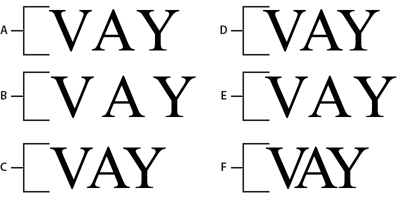|

FTE 提供一組新的文字格式控制項,以處理對齊和字元間距 (特殊字距和字距調整)。也有屬性可控制斷行方式,以及在字行內設定定位停駐點。
對齊文字
對齊文字時,會調整單字 (有時是字母) 之間的間距,讓段落中的所有字行都有相同的長度。此功能的作用是對齊兩側的文字,而單字和字母之間的間距將會有所不同。報紙和雜誌中的文字欄經常會是對齊的。
SpaceJustifier 類別中的
lineJustfication
屬性可讓您控制文字區塊中的字行對齊。LineJustification 類別會定義用來指定對齊選項的常數:
ALL_BUT_LAST
對齊所有文字行,但不含最後一行;
ALL_INCLUDING_LAST
對齊所有文字,包含最後一行;
UNJUSTIFIED
不對齊文字 (預設值)。
若要對齊文字,請將
lineJustification
屬性設為 SpaceJustifier 類別實體,並將該實體指定給 TextBlock 實體的
textJustifier
屬性。下列範例會建立一個段落,而該段落除了最後一行之外,其他所有的文字行都是對齊的。
package
{
import flash.text.engine.*;
import flash.display.Sprite;
public class JustifyExample extends Sprite
{
public function JustifyExample()
{
var str:String = "Lorem ipsum dolor sit amet, consectetur adipisicing elit, " +
"sed do eiusmod tempor incididunt ut labore et dolore magna aliqua. Ut " +
"enim ad minim veniam, quis nostrud exercitation ullamco laboris nisi ut " +
"aliquip ex ea commodo consequat.";
var format:ElementFormat = new ElementFormat();
var textElement:TextElement=new TextElement(str,format);
var spaceJustifier:SpaceJustifier=new SpaceJustifier("en",LineJustification.ALL_BUT_LAST);
var textBlock:TextBlock = new TextBlock();
textBlock.content=textElement;
textBlock.textJustifier=spaceJustifier;
createLines(textBlock);
}
private function createLines(textBlock:TextBlock):void {
var yPos=20;
var textLine:TextLine=textBlock.createTextLine(null,150);
while (textLine) {
addChild(textLine);
textLine.x=15;
yPos+=textLine.textHeight+2;
textLine.y=yPos;
textLine=textBlock.createTextLine(textLine,150);
}
}
}
}
若要讓字母以及單字之間的間距不同,請將
SpaceJustifier.letterspacing
屬性設為
true
。開啟字母間距可以減少單字之間出現不美觀之間隔的機率,這種情況有時會在使用簡單對齊時發生。
對齊東亞文字
若要對齊東亞文字,必須進行額外考量。這些文字可以從上到下書寫,且部分字元 (稱為避頭尾字元) 不能出現在行首或行尾。JustificationStyle 類別會定義下列常數以指定處理這些字元的選項。
PRIORITIZE_LEAST_ADJUSTMENT
依據展開或壓縮字行 (視哪種可以產生最想要的結果而定) 來進行對齊。
PUSH_IN_KINSOKU
依據在行尾壓縮避頭尾字元來對齊,或當沒有避頭尾字元或該空間不足時,展開字行來對齊。
PUSH_OUT_ONLY
依據展開字行來進行對齊。若要建立垂直亞洲文字區塊,請將
TextBlock.lineRotation
屬性設為
TextRotation.ROTATE_90
,並將
ElementFormat.textRotation
屬性設為
TextRotation.AUTO
(預設值)。將
textRotation
屬性設為
AUTO
後,文字中的字符會保持垂直,而不會在旋轉字行一起旋轉。
AUTO
設定只會針對全形字和全字符逆時針旋轉 90 度 (由字符的 Unicode 屬性所決定)。下列範例會顯示垂直的日文文字區塊,並使用
PUSH_IN_KINSOKU
選項來進行對齊。
package
{
import flash.text.engine.*;
import flash.display.Stage;
import flash.display.Sprite;
import flash.system.Capabilities;
public class EastAsianJustifyExample extends Sprite
{
public function EastAsianJustifyExample()
{
var Japanese_txt:String = String.fromCharCode(
0x5185, 0x95A3, 0x5E9C, 0x304C, 0x300C, 0x653F, 0x5E9C, 0x30A4,
0x30F3, 0x30BF, 0x30FC, 0x30CD, 0x30C3, 0x30C8, 0x30C6, 0x30EC,
0x30D3, 0x300D, 0x306E, 0x52D5, 0x753B, 0x914D, 0x4FE1, 0x5411,
0x3051, 0x306B, 0x30A2, 0x30C9, 0x30D3, 0x30B7, 0x30B9, 0x30C6,
0x30E0, 0x30BA, 0x793E, 0x306E)
var textBlock:TextBlock = new TextBlock();
var font:FontDescription = new FontDescription();
var format:ElementFormat = new ElementFormat();
format.fontSize = 12;
format.color = 0xCC0000;
format.textRotation = TextRotation.AUTO;
textBlock.baselineZero = TextBaseline.IDEOGRAPHIC_CENTER;
var eastAsianJustifier:EastAsianJustifier = new EastAsianJustifier("ja", LineJustification.ALL_BUT_LAST);
eastAsianJustifier.justificationStyle = JustificationStyle.PUSH_IN_KINSOKU;
textBlock.textJustifier = eastAsianJustifier;
textBlock.lineRotation = TextRotation.ROTATE_90;
var linePosition:Number = this.stage.stageWidth - 75;
if (Capabilities.os.search("Mac OS") > -1)
// set fontName: Kozuka Mincho Pro R
font.fontName = String.fromCharCode(0x5C0F, 0x585A, 0x660E, 0x671D) + " Pro R";
else
font.fontName = "Kozuka Mincho Pro R";
textBlock.content = new TextElement(Japanese_txt, format);
var previousLine:TextLine = null;
while (true)
{
var textLine:TextLine = textBlock.createTextLine(previousLine, 200);
if (textLine == null)
break;
textLine.y = 20;
textLine.x = linePosition;
linePosition -= 25;
addChild(textLine);
previousLine = textLine;
}
}
}
}
特殊字距和字距調整
特殊字距和字距調整會影響文字區塊中相鄰字元組之間的距離。特殊字距可控制字元組如何相互「搭配」(例如「WA」或「Va」)。特殊字距設定於
ElementFormat
物件中。預設為啟用 (
Kerning.ON
),而且可以設為 OFF 或 AUTO,在啟用的情況下,如果不是漢字、平假名或片假名,則特殊字距只會套用至字元之間。
字距調整會在文字區塊中的所有字元之間加上或減去固定的像素數,而且也會設定於
ElementFormat
物件中。它可用於內嵌和裝置字體。FTE 支援兩個字距調整屬性:
trackingLeft
會從字元左邊加上/減去像素,而
trackingRight
會從右邊加上/減去像素。如果使用特殊字距,則會在每個字元組的特殊字距值加上或減去字距調整值。

-
A.
-
Kerning.OFF
-
B.
-
TrackingRight=5、Kerning.OFF
-
C.
-
TrackingRight=-5、Kerning.OFF
-
D.
-
Kerning.ON
-
E.
-
TrackingRight=-5、Kerning.ON
-
F.
-
TrackingRight=-5、Kerning.ON
var ef1:ElementFormat = new ElementFormat();
ef1.kerning = Kerning.OFF;
var ef2:ElementFormat = new ElementFormat();
ef2.kerning = Kerning.ON;
ef2.trackingLeft = 0.8;
ef2.trackingRight = 0.8;
var ef3:ElementFormat = new ElementFormat();
ef3.trackingRight = -0.2;
繞排文字的斷行
ElementFormat
物件的
breakOpportunity
屬性會決定當繞排文字分成多行時,哪些字元可用於斷行。預設值
BreakOpportunity.AUTO
使用的是標準 Unicode 屬性 (例如在單字之間斷行以及連字號處斷行)。使用
BreakOpportunity.ALL
可將任何字元視為斷行機會,而這適用於在路徑中將文字斷行的效果。
var ef:ElementFormat = new ElementFormat();
ef.breakOpportunity = BreakOpportunity.ALL;
定位停駐點
若要在文字區塊中設定定位停駐點,請建立 TabStop 類別實體以定義定位停駐點。
TabStop()
建構函式的參數會指定如何對齊文字與定位停駐點。這些參數會指定定位停駐點的位置以及要對齊的值 (針對小數點對齊,並以字串表示)。此值一般是小數點,但也可以是逗點、貨幣符號、日元符號或歐元符號 (舉例來說)。下行的程式碼會建立定位停駐點 tab1。
var tab1:TabStop = new TabStop(TabAlignment.DECIMAL, 50, ".");
一旦建立文字區塊的定位停駐點之後,請將它們指定給 TextBlock 實體的
tabStops
屬性。因為
tabStops
屬性需要 Vector,所以請先建立 Vector 並在其中新增定位停駐點。Vector 可讓您將一組定位停駐點指定給文字區塊。下列範例會建立
Vector<TabStop>
實體,並在其中新增一組 TabStop 物件。然後,它會將定位停駐點指定給 TextBlock 實體的
tabStops
屬性。
var tabStops:Vector.<TabStop> = new Vector.<TabStop>();
tabStops.push(tab1, tab2, tab3, tab4);
textBlock.tabStops = tabStops
如需有關 Vector 的詳細資訊,請參閱
使用陣列
。
下列範例會顯示每個 TabStop 對齊選項的效果。
package {
import flash.text.engine.*;
import flash.display.Sprite;
public class TabStopExample extends Sprite
{
public function TabStopExample()
{
var format:ElementFormat = new ElementFormat();
format.fontDescription = new FontDescription("Arial");
format.fontSize = 16;
var tabStops:Vector.<TabStop> = new Vector.<TabStop>();
tabStops.push(
new TabStop(TabAlignment.START, 20),
new TabStop(TabAlignment.CENTER, 140),
new TabStop(TabAlignment.DECIMAL, 260, "."),
new TabStop(TabAlignment.END, 380));
var textBlock:TextBlock = new TextBlock();
textBlock.content = new TextElement(
"\tt1\tt2\tt3\tt4\n" +
"\tThis line aligns on 1st tab\n" +
"\t\t\t\tThis is the end\n" +
"\tThe following fragment centers on the 2nd tab:\t\t\n" +
"\t\tit's on me\t\t\n" +
"\tThe following amounts align on the decimal point:\n" +
"\t\t\t45.00\t\n" +
"\t\t\t75,320.00\t\n" +
"\t\t\t6,950.00\t\n" +
"\t\t\t7.01\t\n", format);
textBlock.tabStops = tabStops;
var yPosition:Number = 60;
var previousTextLine:TextLine = null;
var textLine:TextLine;
var i:int;
for (i = 0; i < 10; i++) {
textLine = textBlock.createTextLine(previousTextLine, 1000, 0);
textLine.x = 20;
textLine.y = yPosition;
addChild(textLine);
yPosition += 25;
previousTextLine = textLine;
}
}
}
}
|
|
|
